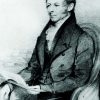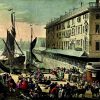Josiah Roberts is one of the more elusive of all those named in the streets of Adelaide. He drifts across the landscape in a mysterious haze, and any mention of his name usually evokes a blank stare.
There are at least three reasons for this. Firstly, the Adelaide City Council of the late 1880s decided to abandon the name Roberts Place and to elevate one of the dignitaries of the day. They renamed it after Sir Edwin Smith, a former mayor of Adelaide who reclaimed the River Torrens precinct with an arboreal makeover and a popular beautification process. Secondly, the configuration of access through the Parklands separating Adelaide proper from North Adelaide has changed several times since Colonel William Light’s first survey, and the short road originally known as Roberts Place has now been subsumed within Sir Edwin Smith Avenue, the link road from King William Road through Melbourne Street to the north-eastern suburbs. Originally this short road, facing the Parklands, extended along the eastern face of both the Memorial and Women’s and Children’s hospitals. Thirdly, and perhaps most poignantly, the paucity of knowledge about Josiah Roberts stems from his belated appearance as one of the South Australian commissioners in London.
The Street Naming Committee named all the commissioners out of respect for the whole process of colonisation. They could hardly deny any members a place in history. However, Roberts, who was George Fife Angas’ nominee and replacement after the Colonial Office insisted that Angas step down because of a conflict of interest, was hardly known to any of them. Indeed John Brown, who was helping around the Commissioner’s office from the beginning, expressed his surprise at the appointment.
Angas was given the courtesy of nominating his own replacement on the Commission. He turned firstly to the Reverend John Clayton, an associate of his, and Josiah Roberts from the British and Foreign Sailors Society for Promoting the Moral and Religious Welfare of Seamen. The Reverend Clayton apparently declined Angas’ invitation, prompting him to approach his merchant friend Roberts, who was also affiliated with the British and Foreign Bible Society.
Both Roberts and Angas shared many common interests. Both men were merchants with experience in the North Atlantic and elsewhere outside Britain; Angas in Nova Scotia and Roberts in the United States, especially in and around Philadelphia. They were also deeply committed to the spread of the Christian gospel, hence their work with the British and Foreign Bible Society. They were as one when it came to the religious and spiritual welfare of merchant seamen worldwide. Finally, Roberts and Angas were both of an age which set them apart somewhat from the younger aspirants in the office of the Commission.
The few sources available on Josiah Roberts suggest he was an Englishman who sought a commercial future in the United States sometime prior to the close of the eighteenth century. He was born in England and christened on 22 April 1773 in Kidderminster, Worcestershire. By the late 1790s he was residing in Philadelphia and apparently of sufficient status in polite republican society to be invited to a ball in honour of the retiring George Washington, America’s first president. This was held on 22 February 1798. Very shortly afterwards, in a ceremony which took place in Philadelphia (in 1801), Josiah Roberts married Mary Davy, the daughter of John and Elizabeth Cadlick-Davy who were from Crediton in Devon, England. Mary and some of her sisters had emigrated to America with their brother, William Davy, in 1794.
William had been in business with Josiah since the late 1790s. Their relationship, in business and religious matters, probably sprang from a link with the Protestant Dissenters of Kidderminster, where William had married Susanna Broome on 2 June 1780. Mary and brother William were naturalised as United States citizens on 31 August 1796, accounting for James Stevens Curl’s conclusion that Josiah’s wife was an American, although it is perhaps somewhat misleading.
The Philadelphia directory, for 1798 describes the business activity of the two friends as William Davy and Josiah Roberts & Co., textile merchants of 59 South Water Street, Philadelphia. They also had premises on Germantown Road, where they were known as Davy, Roberts & Co., calico printers. Apparently they profited from the significant numbers of English textile artisans who settled in that vicinity after American independence.
Josiah and Mary, who was seven years his senior, set up house at 212 South Third Street, Philadelphia. Their firstborn, Charles (b. 1802), who later followed his father in business, eventually became a director of the South Australian Company. Their second son, Henry, was born in April 1803.
In 1804 Roberts and his young family returned to live in London, where three more children were born in quick succession: Frederick (b. 1805), and twins Maria and Elizabeth (b. 1808).
Josiah Roberts eventually settled his family into a substantial property at Camberwell and immersed himself in business and religious matters. There was no logical contradiction between these two interests for him, and like the traits displayed by Angas, strong religious discipline was inherently complementary to good business practice for them both. Seizing on the opportunities afforded by the fledgling South Australian Company, the Roberts family became directly involved. His firstborn, Charles, who was a broker dealing in spices, pharmaceuticals and saltpeter, became a director. Josiah’s third son, Frederick, was invited to take up a directorship with the London and Croydon Railway Company. Josiah had shares in both. The family also had a financial interest in the Equitable Reversionary Interest Society, a financial institution somewhat like an insurance company. Two of Josiah’s grandsons continued the family involvement with South Australia throughout the nineteenth century. Frederick Albert Roberts (son of Charles) was a director of the Equitable Reversionary Interest Society and an auditor of the South Australian Company. His younger brother, Charles Gay Roberts, rose to become Chairman of the South Australian Company and visited Australia in 1894 where he spoke to the Adelaide Democratic Club.
Josiah Roberts had retired from business affairs and was ageing gracefully when he was unexpectedly appointed to the South Australian Commission. His long association with Lord Glenelg, Samuel Mills and Angas through their work with the British and Foreign Bible Society virtually guaranteed his appointment in Angas’ place. All the more so, as Lord Glenelg, an avowed religious dissenting Philosophical Radical, had by April 1835 been made Secretary to the Colonial Office. It was a clever move by Angas, as he extracted a promise from Roberts to act as a conduit, thus keeping Angas informed of matters in the colony and at the Colonial Office, including any new appointments. In his role as a commissioner Roberts also assumed a role of liaison between the commissioners and Treasury, and he remained a member until it was disbanded in 1839–40.
We know very little about the personality and style of Josiah Roberts, but his demeanour and dress suggest some status in the community and a sense of personal discipline and style. On 18 November 1846, Josiah Roberts died of modest means at his home in Camberwell Terrace, and there is some speculation he had successfully dispersed his family wealth to all his offspring. His death certificate says he died of ‘natural decay and old age’.






Comments